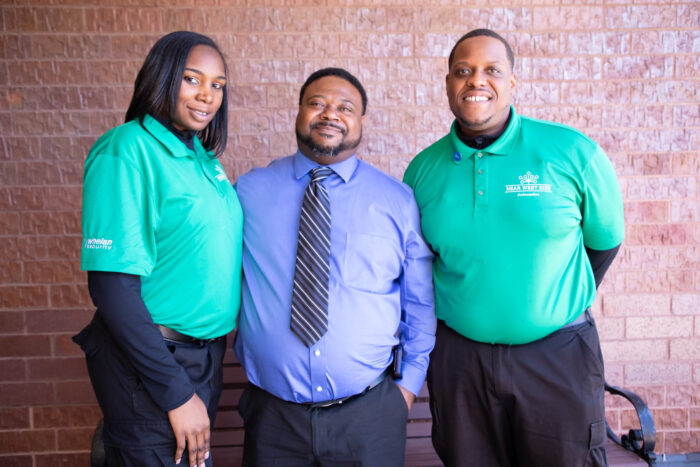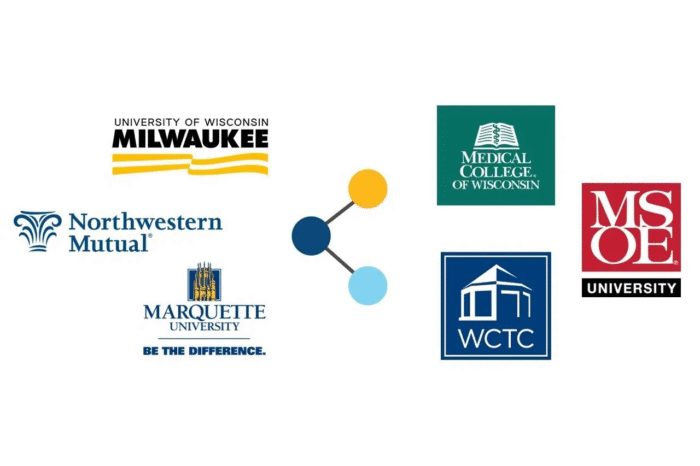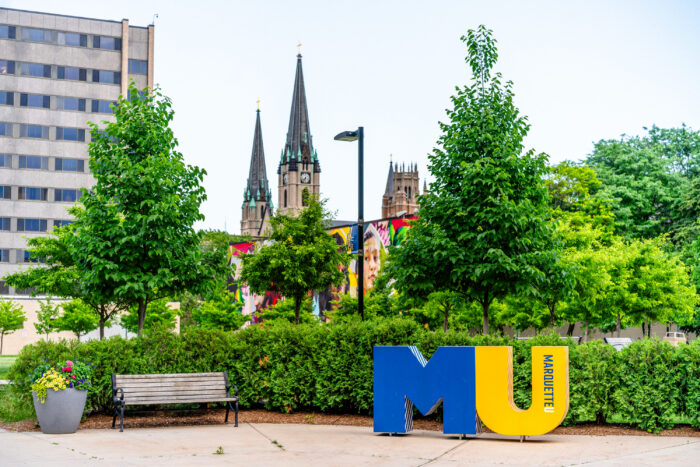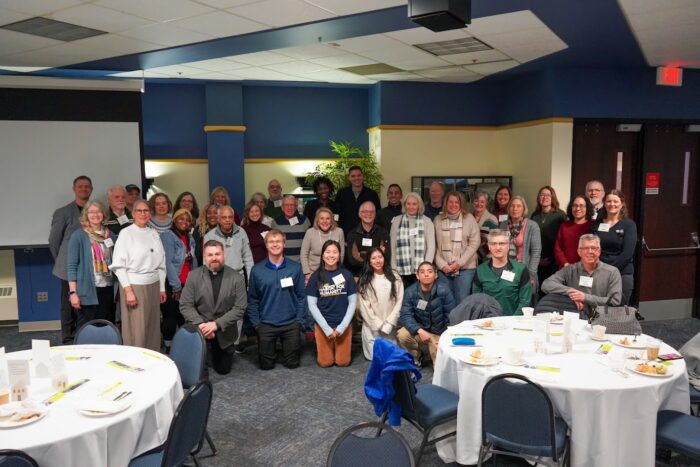
As the President’s Task Force on Community Safety continues to address safety and security on campus and in the community, members of the Marquette community, including those serving on several task force workgroups, have been collaborating with neighborhood organizations to focus on crime prevention and community building.
Last week, Near West Side Partners (NWSP) convened its first Business Check-In of the year to focus on improving safety and promoting business well-being. NWSP is a nonprofit organization focused on making the Near West Side a great place to live, work, play and stay by revitalizing and sustaining thriving business and residential corridors. Its board and working teams include institutional stakeholders, civic leaders and residents.
Bobby McQuay, community outreach and safety manager at NWSP, and Kelly O’Neil, a prosecutor from the District Attorney’s Office, convened all business owners to meet one another and discuss business safety. All Near West Side businesses from 27th Street and eastward were invited to participate.
Marquette University Police Officer Tom Wichgers is known at Marquette for conducting various safety trainings — self-defense, personal security awareness and active shooter training — but he also sits on the Safety Team and Tenant Council groups at NWSP. Wichgers joined the meeting as a safety resource.
“One of the most important things is for people to know their neighbors,” Wichgers says. “When businesses can share what they’re experiencing and seeing, it can help identify solutions. Plus, it’s a great way to build community.”
Attendees at the Business Check-In discussed target-hardening to deter crime, reckless driving and clarifying parking issues. One apartment property owner talked about some of the strategies he’s used to reduce parking issues to help ensure his tenants had the spots they expected for their vehicles.
They also addressed the importance of improving property aesthetics, such as cleaning and maintaining sidewalks, easements, and windows. These are aspects of Crime Prevention through Environmental Design, which the university also uses to promote an active and vibrant environment.

Attracting businesses and supporting residents
One aspect of NWSP is working with start-up businesses and emerging entrepreneurs to find commercial space.
“We’re fastidious right up front to make sure their business has what it needs to succeed in a physical location here,” says Lindsey St. Arnold Bell, associate director of NWSP and co-chair of the communications workgroup of the Safety Task Force. “Having more and more successful businesses in the Near West Side shows the fertile ground here.”
NWSP and its partners offer myriad business resources: finding commercial space, redevelopment support, a variety of grants and business loans. It has a business toolkit and a number of safety resources as well.
NWSP is part of Business Improvement District 10, for which Marquette University Associate Vice President of Public Affairs Rana Altenburg serves as a member. (Altenburg is also co-chair of the community partnership workgroup on the Safety Task Force.) BID 10 serves more than 350 businesses in five neighborhoods, helping them improve shared community, increase property value and make the area more attractive to customers, employees and visitors. The BID considers grants for education and consulting, public art projects and security equipment.
St. Arnold Bell talked about the importance of being able to share resources and expertise among NWSP anchor institutions: “We secured funding to buy cameras to install along 27th Street, but we didn’t have the expertise in knowing what to purchase and where to install them. MUPD has an extended network of cameras, so they were an amazing resource for us in assessing what to buy and where to put them.”
To help with safety and security strategies throughout the Near West Side, MUPD Chief Edith Hudson co-chairs one of NWSP’s working teams to conduct a monthly safety and security meeting involving all security teams from the anchor institutions.
In helping businesses, NWSP interacts with residents consistently, too, and has an extended group of partners it involves to help residents who may need health, food and housing resources. It offers an incentive program to support renters seeking to be homeowners and also provides assistance for home repairs.
St. Arnold Bell shares a recent story when a new entrepreneur who was renovating a commercial space noticed a woman who appeared to be living in her van in the parking lot:
“Our team initially approached her to establish a relationship, and we realized she was having a mental health problem. We tried to coax her into getting treatment, but you obviously can’t force anyone to do that. We involved MUPD to keep an eye on her to ensure her safety, and eventually we involved Milwaukee County Housing First to get her in stable housing.”
NWSP has a homeless intervention team and works with Marquette University, which leads biweekly meetings in and around campus. When tents appeared in King Park north of campus, the group worked with Milwaukee County and the Parks Department to find housing resources. The NWSP Ambassadors worked with those living in tents and were able to get everyone living in permanent supportive housing. NWSP also works with United Way to prevent evictions before they’re filed.
“We can’t do our work without knowing how to build relationships and having consistent interactions with those in our neighborhood,” St. Arnold Bell says.
Integral to relationship-building is the NWSP Ambassadors program. This group interacts with the homeless population and connects them with resources. Ambassadors are Near West Side residents themselves who are a well-connected in the community.

Marquette faculty, staff and students supporting the Near West Side
Members of the Marquette community are highly involved in the Near West Side and contribute to the relationships and strategies that make community collaboration successful.
Current Marquette students directly support NWSP as interns, often helping with communications, event promotion, data collection and reporting. They help lead NWSP’s annual residents survey.
Anne Marie Gunn, a recent Marquette graduate, supports the Commercial Corridor program, helping entrepreneurs find spaces, make sure they’re business-ready, and negotiate with landlords, developers and architects.
In addition, administered through the Marquette University Center for Peacemaking is the Promoting Assets, Reducing Crime (PARC) initiative, a multi-year collaboration launched in 2015 that engages neighborhood anchor institutions, residents, city leaders and other stakeholders to promote assets and reduce crime in Milwaukee’s Near West Side neighborhoods.
PARC is a data-driven and place-based example of community collaboration to address neighborhood opportunities and challenges. It focuses on four main activities: promoting economic development, enhancing housing stock, improving public safety and strengthening neighborhood connections. PARC models how community-based participatory research projects can facilitate change and capture the input of neighborhood stakeholders. Many Marquette students, faculty and staff have participated in and contributed to this initiative.
“Our interventions are data-informed and goal-oriented, and we use our existing assets and relationships in the community to do the work,” says Pat Kennelly, director of the Center for Peacemaking and member of the resources workgroup on the Safety Task Force. “Not only does PARC provide students with a meaningful experiential learning opportunity, but this is way in which all those involved can advance the Marquette mission right where we live and work.”
More leaders from the College of Nursing, Klingler College of Arts and Sciences, the Office of Research and Innovation, and MUPD lead working teams in the Near West Side focused on health, data, housing, commercial corridors and safety.

Getting — and staying — involved
Last weekend, the Center for Community Service hosted the Marquette Community Day of Service, which dispatched groups of volunteers across the seven neighborhoods in the Near West Side.
Throughout the year, though, the student group CAMPus Impact aims to get students out into the Near West Side neighborhoods not just to do service but also for enjoyment. Some students go to lunch or go on a tour through NWSP. The organization holds a fall break service/immersion trip where students partner with nonprofits and residents in the Near West Side.
“It’s good to get to know our neighbors and contribute to the aesthetic vitality of the community,” said Sherri Walker, assistant director for the Center for Peacemaking, “and it is also important to appreciate the wonderful assets of our neighborhood.”
The current student leaders of CAMPus Impact are seniors Molly Brett, Opus College of Engineering, and Emma Hudson-Mariet, Klingler College of Arts and Sciences.
“There are so many wonderful people and organizations in our neighborhood. It is important for Marquette students to get out of the Marquette bubble and engage with the neighborhood we live in! Our goal as CAMPus Impact is to build relationships between Marquette students at our Near West Side community through service and experiences in our neighborhood,” the students say.
Students who are interested in getting involved for the fall semester should email CAMPus Impact at mucampusimpact@gmail.com.


